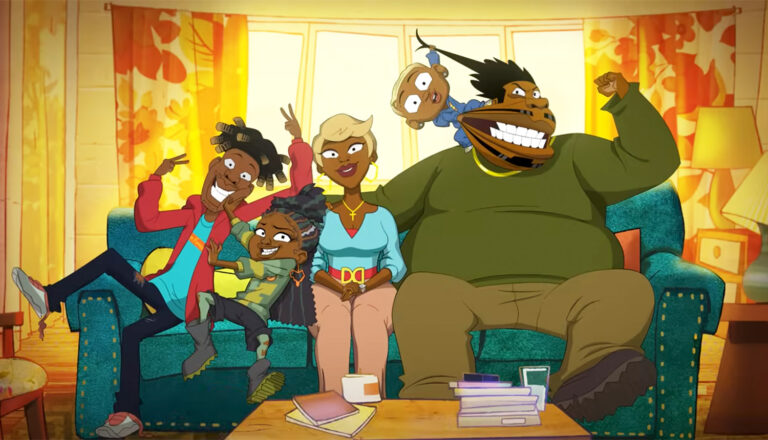
Good Times
Netflix takes a classic sitcom, Good Times, and turns it into a vulgar, violent, sexually-charged TV-MA show.

“Who the h— is Phyllis Shaffley?!”
So grouses feminist author Betty Friedan as a who’s who of the 1970s women’s movement celebrate their political successes. A newsletter from the right-wing political activist is in her hands.
Schlafly, a staffer corrects. With two letter l’s.
Friedan moves on. “It’s not like I’m ever going to say that f—ing woman’s name again,” she says.
Wanna bet?
That scene takes place in 1972, when the National Women’s Political Caucus is one of the most powerful organizations in the country. It’s pushing the Equal Rights Amendment rapidly through Congress with nary a ripple of opposition. One of its members, Congresswoman Shirley Chisholm, becomes the first black female candidate for President of the United States. The caucus is piling up victory after victory with barely a breath in between. Few, either Republicans or Democrats, are willing to stand up to them.
And then comes Phyllis Schlafly, a former model, a doctorate holder from St. Louis’ Washington University, a brilliant-if-overlooked expert in international policy. She never wanted to be the leader for the anti-ERA movement, the miniseries suggests; she wanted to talk about nuclear treaties and American-Soviet relations. But unable to get traction in D.C.’s male-centric political spheres, she switches tacks and becomes a voice for women ironically disenfranchised by the women’s movement: wives and mothers who love being wives and mothers.
Phyllis—brilliant, charismatic and, yes, beautiful—becomes the ERA’s one-woman wrecking crew. Betty Friedan, ironically, is the first to take her seriously, debating Phyllis on Good Morning America. But every member of the women’s caucus—Chisholm, Gloria Steinem, Bella Abzug and (the only prominent Republican member) Jill Ruckelshaus belatedly discovers the threat she poses.
But even as the Phyllis of Mrs. America finds success by defending the traditional definitions of wife and motherhood, her career looks more like one that’d be championed by Friedan and Abzug. Servants and her own unmarried sister, Eleanor, take care of Phyllis’ kids. Phyllis subtly clashes with husband Fred over what’s expected of her as a wife and mother. If the women’s caucus’ primary sin is hubris, the show suggests, Phyllis’ own is hypocrisy.
Let’s get this out of the way first: When it comes time for Emmy nominations to be handed out, Mrs. America could land a boatload. The miniseries features scads of talented actresses, from Rose Byrne and Elizabeth Banks to Emmy winners Margot Martindale (Azbug), Tracey Ullman (Friedan) and Sarah Paulson (Phyllis’ friend Alice). And we haven’t even gotten to Oscar/Golden Globe/BAFTA/SAG/etc. winner, Cate Blanchett, who turns Phyllis Schlafly into a formidable, sometimes manipulative and, in the show’s eyes, misguided force to be reckoned with.
Naturally, the guardians of Schlafly’s legacy take issue with this difficult Hollywood depiction. A biographer called her depiction in the show “deplorable,” according to The Federalist. And mrsamerica.org had this to say:
According to Schlafly’s daughter Anne Schlafly Cori, “Mrs. America” gets her mother’s hair and wardrobe exactly right but fails to capture her warmth and ability to inspire thousands of women. It also badly mischaracterizes the Schlafly marriage.
‘Course, the fact that the website is titled Mrs. America suggests that whether the portrayal is on point or not, Schlafly’s supporters know an opportunity to reenergize her legacy when they see it.
We should note that Plugged In is not a disinterested party when it comes to Mrs. America. Schlafly (who died in 2016) and Plugged In’s parent ministry, Focus on the Family, have long embraced the same ideals when it comes to God, marriage and family, and Focus’ founder James Dobson told CNBC in 2016 that “she essentially launched the pro-family, pro-life movement.” It’s possible that without Phyllis Schlafly, there’d be no Plugged In.
But in watching the show’s early episodes, I found Schlafly’s portrayal less negative than some. Yes, Blanchett’s Schlafly seems to use disaffected homemakers to power her own political career. Yes, the program shows that Schlafly’s own professional and personal life were often hamstrung by sexism, stressing that the amendment she opposed had more merit than Schlafly cared to admit. Yes, in the show’s eyes, Schlafly is more villain than hero, who may grow meaner by the episode. The New Yorker calls Blanchett’s Schlafly a “pastel nightmare.”
But in an age in which conservatism and traditionalism are often portrayed in popular culture as bastions for the ignorant and bigoted, Blanchett’s Schlafly lays those stereotypes bare. She’s a brilliant, passionate advocate for her conservative ideals. And some of the words we hear from her still resonate today.
In the first episode, speaking to a group of women, Phyllis stresses she’s all for women working outside the home—but they shouldn’t be shamed for staying home, either. “Libbers love to say that they’re dedicated to choice,” she says. “But if you dare to choose the path of full-time mother, well, there must be something wrong with you.”
Socio-politics aside, though, the show has some issues. Language is perhaps the biggest. But the camera takes us behind the bedroom door at times, too. We see (in the show’s eyes) Schlafly’s difficult, dysfunctional sexual relationship with her husband, John. We see and hear about same-sex relationships, and issues such as abortion, gender and marriage will certainly be important topics as the show moves on.
Mrs. America may give us a riveting, flawed portrait of Phyllis Schlafly. Whether it reflects the real person, or whether it gives adequate voice to the values she represented, is questionable.
As the episode opens in 1971, Phyllis Schlafly doesn’t care a whit for the Equal Rights Amendment, then barreling through Congress. She’d much rather talk about national defense, especially the nuclear disarmament talks that then-President Richard Nixon wants to hold with Moscow. But when she’s roundly ignored during a high-level meeting with powerful senator Barry Goldwater—she’s even asked to fetch a pencil so she can “take notes”—Phyllis pivots and turns the ERA into her primary political cause. This, in spite of the fact that even most conservative politicians are on board with the amendment.
“No one wants to vote against an amendment that has ‘Equal Rights’ in the title,” a family friend tells her.
“Which is exactly why they put it in the title,” John, Phyllis’ husband, says.
“Which is exactly why we keep losing to them,” Phyllis adds.
We see that Phyllis is subjected to various forms of sexism that feel pretty cringeworthy today. She poses in a bikini for a Republican fundraiser. When she gets home after a long day, John forces herself on her. (We see her in a slip, finally acquiescing to his desires, and he is on top of her mostly clothed.) A politician constantly touches her on the shoulder and back, until she finally, and forcefully, pushes his hand away—making it clear that his advances are unwanted.
She also seems to be a bit of an indifferent mother herself, largely leaving the care of her six children (at least in this episode) to her servants and her unmarried sister.
We hear references to abortion and lesbianism. John and Phyllis lead their large family in prayer at the dinner table, where everyone holds hands and Phyllis crosses herself afterward. When women’s rights activists confront Goldwater for his failure to support the ERA, he says that he answers to “a higher authority.” When one tells him that the voters will indeed hold him accountable, Goldwater says he was referring to God—not that she would know anything about Him, he adds. People drink wine and other forms of alcohol, and they say the f-word once, along with “a–” and “h—.”


Paul Asay has been part of the Plugged In staff since 2007, watching and reviewing roughly 15 quintillion movies and television shows. He’s written for a number of other publications, too, including Time, The Washington Post and Christianity Today. The author of several books, Paul loves to find spirituality in unexpected places, including popular entertainment, and he loves all things superhero. His vices include James Bond films, Mountain Dew and terrible B-grade movies. He’s married, has two children and a neurotic dog, runs marathons on occasion and hopes to someday own his own tuxedo. Feel free to follow him on Twitter @AsayPaul.

Netflix takes a classic sitcom, Good Times, and turns it into a vulgar, violent, sexually-charged TV-MA show.

While its protagonist might live a nuanced life, The Sympathizer’s problematic content can’t be described the same way.

Say hola once again to the iconic explorer in this faithful reboot of the children’s series.

Based on a popular video game, Ark: The Animated Series features hungry dinosaurs, bloodthirsty people and plenty of problems.